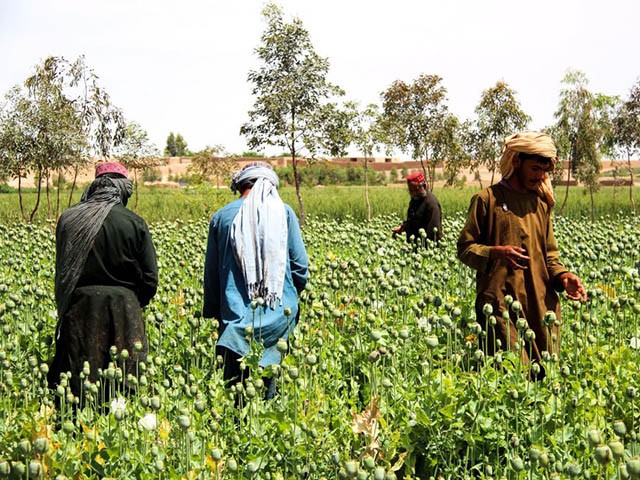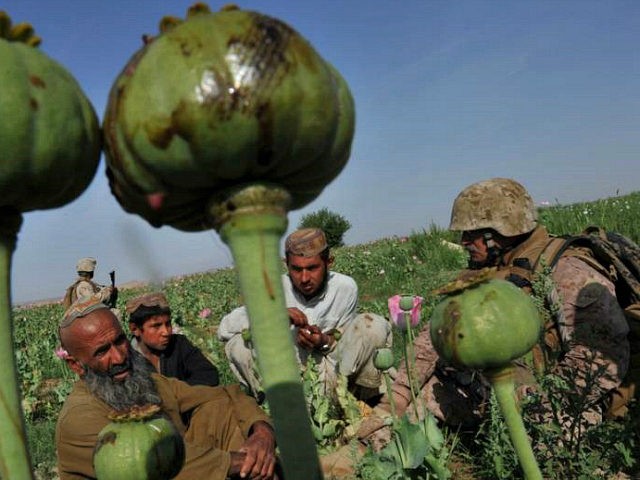The United Nations revealed in a study published on Sunday that, under Taliban rule, Afghanistan’s opium supply dropped by 95 percent in one year and the nation’s opiate economy has experienced “near-total contraction.”
The U.N. Office of Drugs and Crime (UNODC) warned that, while the eradication of what was once Afghanistan’s top crop could result in a reduction in the global supply of heroin and other positive effects, the Taliban’s abrupt ban on opium cultivation with little holistic planning leaves a tremendous void in the Afghan economy that may be filled by fentanyl, methamphetamines, and other drugs.
The Taliban, it warned, did not appear to have any plan to help farmers financially while they transitioned from growing opium to legal crops such as wheat and other cereals.

File/In this photograph dated 15 April 2005, an Afghan soldier with a rocket is pictured in a drive by officials to destroy poppies in a field in the Maiwand district, 45 kms west of the southern city of Kandahar. (Emmanuel Duparcq/AFP via Getty Images)
While many farmers have switched to growing wheat – which requires similar land and care as opium, the UNODC noted – wheat and cereals are far less lucrative and cannot single-handedly replace the profits made by opium, leaving the country vulnerable to food insecurity and even higher levels of poverty.
The Taliban jihadist terror organization, currently operating as the uncontested government of Afghanistan, took over the country in August 2021 after being out of power during the 20-year American presence there. Leftist American President Joe Biden hastened the return of the Taliban by breaking an agreement with the group signed under predecessor Donald Trump that would have seen American troops leave the country by May 2021, extending the Afghan war and prompting tens of thousands of Taliban attacks during a four-month period.
When Biden finally withdrew troops in August 2021, the Taliban marched into Kabul, sending then-President Ashraf Ghani fleeing and resulting in a mostly bloodless seizure of the government.
Taliban terror chiefs announced in April 2022 that they would ban all cultivation of opium poppies, a move the Biden administration praised as a “positive first step.”
Taliban propaganda networks often publish images appearing to burn down acres of poppy crops and celebrating the “graduation” of drug addicts from alleged rehabilitation programs.
ویدیو: مسوولان امارت اسلامی در ننگرهار میگویند که صد تن از معتادین مواد مخدر پس از یک دوره درمان ۴۵ روزه در شفاخانه یکهزار بستر کابل صحتیاب و دوباره به فامیلهای شان تسلیم داده شدند. pic.twitter.com/m4Bj8EUdG3
— باختر خبري آژانس (@bnapashto) October 25, 2021
In November 2022, the UNODC reported that cultivation and opium prices had both “soared” in the aftermath of the ban but, a year later, the U.N. indicated that opium poppies had been largely eradicated in Afghanistan.
Using “almost 900 very high-resolution satellite images on a field-by-field basis,” the UNODC found that, between its 2022 report and the report published on Sunday, “the supply of opium declined by an estimated 95 per cent.” The amount of land being used to cultivate opium fell from 233,000 hectares in 2022 to 10,800 hectares in 2023.
The 95-percent drop in supply raised the price of opium and its associated products significantly, the agency noted, but the lack of product also meant farmers were not profiting from it.
“Farmers’ income from selling the opium harvested in 2023 to traders fell by more than 92 per cent from an estimated $1,360 million for the 2022 harvest to $110 million in 2023,” the UNODC noted.
The Taliban – which the UNODC euphemistically referred to as the “de-facto authorities” (DfA) of Afghanistan – reportedly had no substantive programs to help farmers who stopped cultivating opium. Many turned to wheat, which “shares a similar crop cycle with opium poppy” but is far less expensive, meaning farmers were profiting significantly less from similar work on a similarly sized piece of land. About 68 percent of opium fields documented in 2022 now featured wheat and other cereals, the U.N. noted, in four major provinces: Farah, Helmand, Kandahar, and Nangahar.
“Overall, in the four provinces covered, farmers who replaced opium poppy with wheat forewent about US$ 1 billion of potential cash income between 2022 and 2023,” the U.N. noted, suggesting that an increase in the supply of wheat could “alleviate food security to a certain extent” but result in a sharp increase in poverty, as farmers growing the wheat and those associated with opium harvesting and heroin production suffer from a tremendous decline in income.
Crops with high-profit yields that could potentially replace opium – such as pomegranate and pistachio – take years to properly develop and farmers have little access to aid to keep their families fed while those plants grow, making them unviable alternatives in the short term.

File/In this photograph taken on April 13, 2019, Afghan farmers harvest opium sap from a poppy field in the Gereshk district of Helmand province. (NOOR MOHAMMAD/AFP via Getty Images)
The discussion of what crops could replace opium also does not address the situation with those employed in opium and heroin cultivation who are not farmers.
“The opium harvest creates, on average, the equivalent of more than 100,000 full-time jobs per year in about a third of Afghan villages, supporting not only farmers, but many others in the communities,” the report observed.
For these people, alternatives include manufacturing and trafficking methamphetamine or trafficking in the much deadlier synthetic opioid fentanyl.
“The experience in North America with fentanyl overtaking heroin in major drug markets is illustrative of how a cheaper and readily available synthetic opioid can easily displace heroin,” UNODC warned.
A representative of the United Nations Food and Agriculture Organization (FAO) met with Taliban terrorists at the “Ministry of Agriculture, Irrigation, and Livestock” on Monday to discuss ensuring that Afghan civilians have access to food as the country’s economy faces dramatic changes.
Afghanistan is emerging as a significant global producer of methamphetamine, according to a study published on Tuesday by the European Monitoring Centre for Drugs and Drug Addiction (EMCDDA). https://t.co/ZeGmWhoEVA
— Breitbart News (@BreitbartNews) November 25, 2020
According to the Taliban’s Bakhtar News Agency (BNA), Taliban officials “outlined the needs of Afghan farmers and livestock owners, including improved seed distribution, livestock breeding, vegetable seeds, fruit tree promotion, product marketing, and modern machinery.”
Afghanistan is facing one of the world’s direst humanitarian situations in light of the Taliban takeover, which resulted in much of Afghanistan’s government funding being frozen in international accounts and the Taliban accused of looting the nation’s government coffers. The situation is expected to worsen as neighboring Pakistan announced the deportation of nearly 2 million Afghans present in the country illegally beginning on November 1. The Taliban – which had previously made loud demands for the return of Afghan refugees to the country – objected to the deportations, but claimed it would “provide necessary facilities to the returning businessmen, investors, and industrialists.”
Taliban officials have published propaganda videos of themselves appearing to distribute food aid to returning Afghans.
#مهم: د خدماتي کمیټې له لوري نن غرمه په طورخم ٥٥٠٠٠ راستانه شويو مهاجرینو ته خوراک ویش همدا اوس جریان لري
از سړی کمیته خدمات در طورخم همین اکنون برای ٥٥٠٠٠ هزار مهاجرین عودت کننده جریان توزیع غذا ادامه دارد. pic.twitter.com/4QtRr8l55A
— Bilal Karimi(بلال کـریمي) (@BilalKarimi44) November 5, 2023
The Taliban has also invested in propaganda designed to make it appear to be addressing economic issues in the country, claiming to have made “substantial strides in addressing unemployment.”

COMMENTS
Please let us know if you're having issues with commenting.